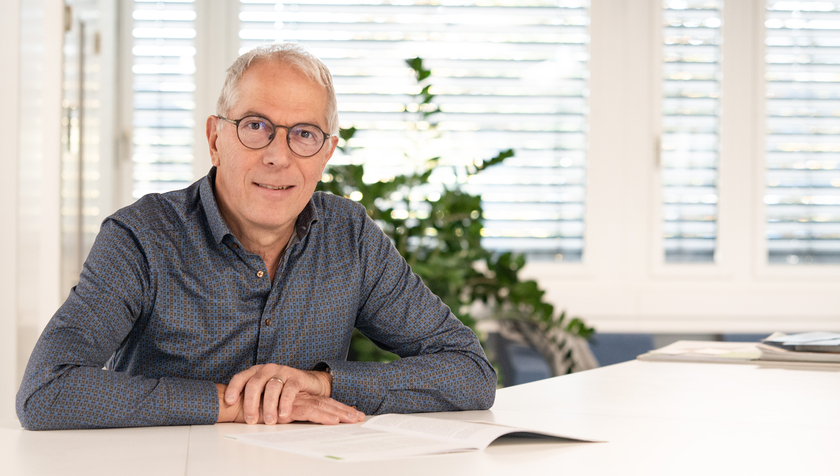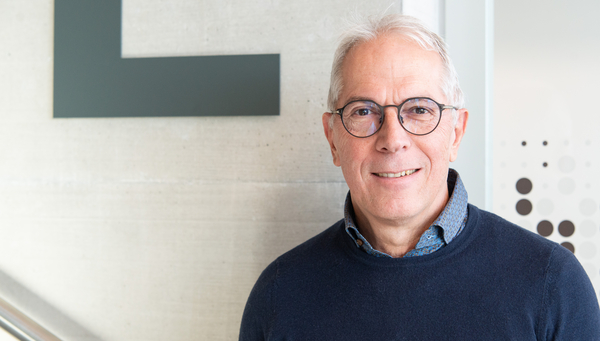Archive detail
Rik Eggen: “I want to dive into a new life”
November 13, 2023 |
Mr Eggen, you have been committed to Eawag, its employees and aquatic research for 30 years: first as a researcher, then as head of department, later as a member of the Directorate and from 2007 to the beginning of 2023 as deputy director. How are you feeling now, so close to leaving?
I feel quite content. I am pleased that the handover to the new management – my successor Christian Stamm and the new director Martin Ackermann – went so well. Now I’m looking forward to the great freedom that lies ahead of me. I’m going to make a clean break. I’m going to throw myself into a new life and not stay part-time in the old world.
“Now I’m looking forward to the great freedom that lies ahead of me.”
What exactly are you planning to do?
At the moment, I’m mainly looking forward to the new freedom. Simply having time to decide spontaneously what I want to do – reading about an event in the newspaper and going straight there. Or, if the weather is nice, simply take out the bikes and head to France for a few days. There are so many exciting things in life besides research. That’s why I decided to retire a year earlier, at the age of 64.
Inspiring prospects, but let’s also look back. 30 years of Eawag – which moments do you remember most fondly?
That is a difficult question. There were a quite number of good moments: when a project was funded, when a doctoral student successfully completed their degree, when all the students passed their exams, when a new urine-diverting toilet was developed, when a new building was completed, when there were chips in the canteen and much more. Unfortunately, there were some sad moments, too. People who were seriously ill or died in an accident. There was also a lot of stress. It wasn’t always sunshine.
Looking back, is there anything you would have liked to have paid more attention to?
We should have tackled the issue of diversity earlier, more decisively and, above all, more broadly. Just recently, for example, we brought a younger female researcher with a young family onto the management board. She was previously a group leader and did not yet have any experience as a department manager. That was inconceivable in the past. I think that this openness to also bring diversity to the Directorate and to elevate junior researchers to positions of responsibility is a very good development.
“I think that this openness to also bring diversity to the Directorate and to elevate junior researchers to positions of
responsibility is a very good development.”
What attracted you to Eawag 30 years ago? And what motivated you to stay involved with Eawag for so long?
I knew the director at Eawag at the time, Alexander Zehnder. He was previously a professor at Wageningen University, in the same department where I had just taken up my first permanent position. He asked me if I would like to come to Switzerland. I thought that sounded cool, as I’d be closer to the Alps. Because I was an alpinist back then.
Why did I stay for 30 years? It was of course a privilege to work with such qualified and highly motivated people, not only in research but also in the supporting departments. People were so open to sharing their knowledge and working together. That motivated me. But it was also a very dynamic environment. I constantly had new tasks and projects, people changed, and there was always new impetus. That inspired me.
You were deputy director for 16 years. However, you were also referred to as “Foreign Minister” because you were in close contact with numerous external stakeholders. Were you happy to take on these tasks?
I really enjoyed doing that. When I came to Eawag, I was a hard-core basic researcher who, as a molecular biologist, investigated individual nucleotides of a genome. However, I quickly threw myself into working with practitioners, engineering offices, cantonal and national authorities, industry and NGOs. The ETH Domain and politics were added to the scope of being deputy director. I was fascinated by the external environment in which research takes place. I was also interested in interdisciplinary collaboration with the engineering and social sciences, both inside and outside Eawag. So that’s probably why I became the “Foreign Minister”. I was also delighted to be made an honorary member of the Swiss Water Pollution Control Association (VSA) in recognition of my collaboration with stakeholders.

What do you think is important in the exchange with these external groups?
People should not only meet on a factual level, but also as human beings. As everywhere else, relationships need to be cultivated. This is not always easy, as the academic world and the practical world are very different. The careers are different, the problems are different, and the language is different. I found it extremely exciting to operate in these two worlds. You have to listen a lot and sometimes drink a beer together. This creates openness and trust, an important basis for dialogue. This also applies to internal contacts. They are just as important and need to be nurtured. That’s why I was sometimes referred to as the “Minister of the Interior”.
“People should not only meet on a factual level, but also as human beings.”
The months and years leading up to the referendums on the drinking water and pesticide initiatives in 2021 were certainly intense. How did you experience this time? And what were the key findings from this?
It was exciting on the one hand, but difficult on the other. It was exciting to learn about the role of science in cooperation with politics. A research institute must limit itself to communicating data and facts in a comprehensible manner and highlighting the consequences of possible courses of action. It is not its task to make recommendations to politicians and to intervene in political discourse.
It was difficult that the practice, with which I am closely networked, often intervenes very actively in political discussions. As a person, I would have liked to have been involved, but as deputy director, that wasn’t possible. Not being able to express my opinion publicly was often challenging for me.
In addition to your duties as deputy director, you continued to be active in research. What are you particularly proud of in your research career?
I am proud that after many years of research in the Micropoll project, wastewater treatment plants in Switzerland are now being expanded to remove micropollutants. Other milestones for me were several major research initiatives, the results of which are now being put into practice, including the transdisciplinary urine source separation project Novaquatis, the interdisciplinary research initiative EcoImpact on the impact of micropollutants in watercourses, the international project Pestrop on pesticides in tropical regions and, currently, the Sinergia project Trapego on the sustainable transformation of Swiss agriculture. I also recently co-initiated the “Climate change and aquatic biodiversity” research programme.
“Milestones for me were several major research initiatives,
the results of which are now being put into practice.”
I am also particularly pleased about the establishment of the Ecotox Centre as a kind of “spin-off” from Eawag. I was one of the initiators. Today, the centre is even known across Europe for its expertise. I am also proud of the two VSA platforms “Water Quality” and “Process Engineering Micropollutants”, an idea of mine that I was able to realise together with the FOEN and the VSA. Today, the platforms are central innovation and consulting centres for policy execution. They are closely networked with our research departments, but are still independent. In this way, they ensure the transfer of knowledge from Eawag research into practice.
What role does water research play today in view of the global challenges of climate change, biodiversity loss and population growth?
Water runs like a common thread through many global challenges. Climate change is visible in the water. The energy transition is closely linked to water via hydropower or cooling and heating with water. Without water, no food production is possible. Biodiversity is most at risk in freshwater. As the population grows, the sustainable management of drinking water and wastewater is becoming increasingly important. Water protects settlements from overheating. There are also conflicts surrounding water. Because when people are faced with the decision of either dying of thirst or moving, they will set off on their way. This is already happening today and will intensify in future. These challenges are enormous and solutions must be developed with the support of science. Without focusing on water, we will not be able to overcome some of the global challenges.
In addition to research, you have also been active in teaching for over 30 years, most recently as a titular professor at the ETH Zurich. How important was this task to you?
That was simply wonderful. Young people are curious and interested. That motivated me. I was able to pass on my experience in inter- and transdisciplinary subjects to the students. I have also supervised numerous doctoral students and postdocs. I have always enjoyed doing that.
Looking back on your research career, do you have any advice for young researchers?
For me, it is crucial that you do what you are convinced of. My experience is that it is extremely difficult to plan a career. I never planned to become a professor or deputy director. It just happened and maybe I was just lucky. I did what I found exciting and important. My advice is therefore: do what you want to do out of your own conviction. Then you will be enthusiastic about it and there is a greater chance that it will turn out well. And a second tip: a good dose of humility and humour.
About Rik Eggen
Professor Dr Rik Eggen studied biology at the University of Nijmegen in the Netherlands. He completed his doctorate in molecular biology at Wageningen University, where he subsequently worked as a researcher and lecturer. Rik Eggen joined Eawag in 1994, became head of the Environmental Microbiology research department in 1996 and established molecular ecotoxicology at Eawag. From 1999 onwards, he worked as a lecturer in the Department of Environmental Social Sciences at the ETH Zurich, where he was appointed titular professor in 2004. In 2005, Rik Eggen became a member of the Eawag Directorate and was ultimately appointed deputy director by the ETH Board in 2007.
Cover picture: For 30 years, Prof. Dr Rik Eggen has been committed to Eawag, its employees and water research, first as a researcher, then as head of department, later as a member of the Directorate and from 2007 to the beginning of 2023 as Deputy Director (Photo: Peter Penicka).

